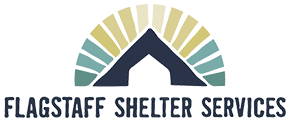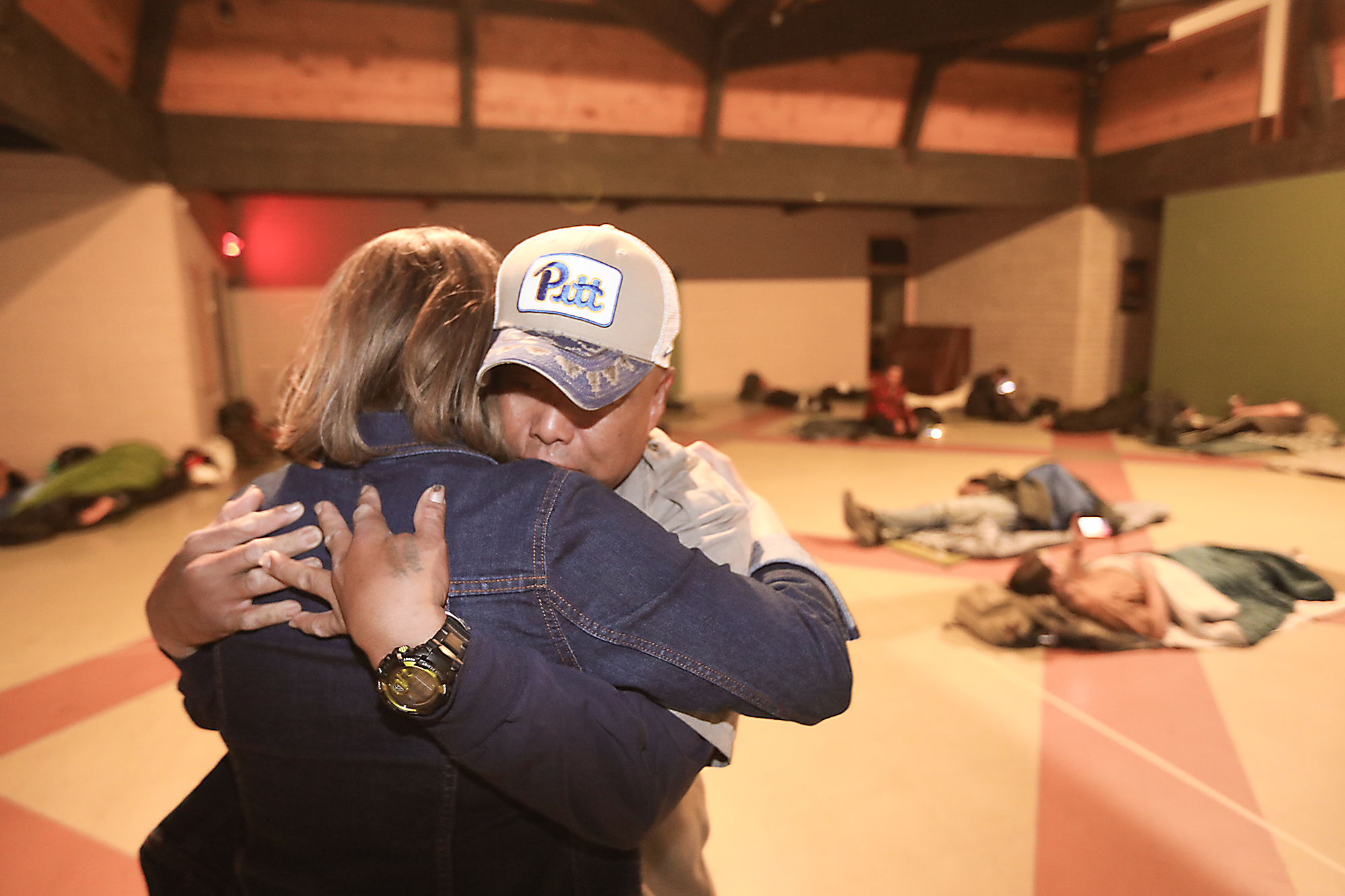COVID-19 took many people off-guard in its rapid spread and after only two weeks, Flagstaff hospitals are already full. COVID-19 patients and vulnerable populations really have no choice but to self-isolate and try to stay safe at home. But what if you don’t have a home?
In Flagstaff, it’s not a theoretical problem. Early on, as cases began to rise, nine people who are homeless in Flagstaff had either tested positive for COVID-19 or had been tested and were awaiting results. That’s not counting those who had tested negative earlier in the week and had been released, or the many who have pre-existing health conditions that make them particularly vulnerable to severe cases of the virus.
If you don’t have a home, where do you go to quarantine yourself? Flagstaff’s hospital beds are all filled – there aren’t any more beds for people who are sick enough to need them, much less for people who have tested positive but who aren’t critically ill. Resources for high-risk individuals are running low and if they are experiencing homelessness, there was nowhere they could go to stay safe. There was no good option available, so Flagstaff Shelter Services knew we had to do something.
Safe spaces
At Flagstaff Shelter Services, our normal mission is ending homelessness, helping people living in Flagstaff, Arizona to obtain affordable housing in Flagstaff or to move from the street into stable, permanent homes through our housing first programs.
We also maintain an emergency overnight shelter where anyone, regardless of faith, mental health or sobriety, can walk in off the street for a hot dinner and a bed for the night.
If you don’t have a home, where do you go to stay safe?
Right now though, our focus is on helping people experiencing homelessness to shelter in place in our emergency shelter – and to provide a safe quarantine zones for anyone who is either a high-risk individual or who may be positive for coronavirus and who doesn’t have a place to call home.
It’s our mission to our clients but more importantly now, it’s critical to the welfare of the entire community; by giving homeless individuals who are most susceptible to COVID-19 a place in which to isolate, keeping the larger community safe.
That’s especially important now, as Flagstaff Medical Center and Tuba City Regional Health Care have reached capacity for critical care patients — meaning there’s no room for any more COVID-19 cases. That means anyone who tests positive for coronavirus is told to go quarantine themselves for 14 days. But where do you quarantine if your home is a sleeping bag in a vacant lot with 10 other people?
A makeshift quarantine facility
To solve that problem, Flagstaff has a new quarantine zone — two hotels. When the pandemic hit, Flagstaff Shelter Services opted not only to expand our 24 hour services, but also to provide an alternative space to take care of people who are most vulnerable to severe cases of coronavirus.
Flagstaff Shelter Services has secured blocks of rooms at two local motels where we will be able to transfer some of our highest-risk clients from staying at the shelter, to being able to quarantine in a hotel room by themselves.
Screening
When any person experiencing homelessness comes to Flagstaff Shelter Services, we screen them for COVID-19. If they’re not feeling well and have recently traveled to a high-risk city, or if they’re exhibiting any symptoms or if the staff has any reason to think they might be infected, they’re immediately taken aside.
If the person has insurance and a doctor – not an uncommon situation because the cost of living in Flagstaff is so high that many people have decent jobs and insurance but can’t afford an apartment — we set up a tele-health call so a doctor can determine if they need a referral for coronavirus testing. A physician’s referral is the only way most people in Flagstaff can get tested right now.
If the person does not have insurance, the county health facility handles the referral for testing instead. Either way, once a physician has determined that the test is warranted, the person needs to be quarantined until the results come back.
That’s currently taking between 36 hours to a week.
Confinement
The good news for our clients is that, even though they have to be quarantined we can refer them a hotel room with a tv and a private bathroom in which to wait.
Of course, a person who can get a referral for a test is also a person who is deemed to be incredibly infectious.
Teams of staffers wearing personal protective equipment (PPE) escort clients to their hotel rooms to wait. For some, it’s a nice change from living in a sleeping bag, a tent or a car. For others, it’s really a hardship. Many of our clients have mental health issues. Many others have alcohol or drug addiction and once we escort them to their quarantine rooms, they really should not leave (we can’t hold people against their will).
Even when a client doesn’t have an underlying issue, being confined to a solitary room for days or weeks is an emotional hardship, especially for people used to moving about outdoors at will.
Staying in
Everyone who is either transferred from our shelter, or referred to us from other agencies to stay at our quarantine hotels, will still go through our Front Door program. Through this coordinated entry approach, we are trying to ensure that these clients have the resources available to them to continue progress towards their housing goals. Meals (provided by the Flagstaff Family Food Center) are delivered to the individual rooms, laundry services are available and our staff facilitates tele-health check-ins with North Country HealthCare as well as behavioral health appointments with The Guidance Center to monitor their physical and mental health.
It’s a quiet respite place and it’s a nice one but it’s not our only option. If a client isn’t doing well in the hotel, isn’t following the quarantine rules or isn’t keeping the hotel room in a reasonably good condition, we can move them back to the Flagstaff Shelter Services building.
There are enough rooms, but there isn’t enough money to sustain this in the long-term.
The hotels have plenty of rooms – including some suites for families – where people can stay to give them the opportunity to isolate themselves. These additional rooms not only offer a greater degree of safety to our clients who have chronic health issues or who are senior citizens, this also alleviates some of the congestion issues at our primary shelter itself. This is our best bet at preventing the virus’ spread within our community.
There are enough rooms, but there isn’t enough money to sustain this in the long-term. The hotel needs staff willing and able to work in a high-risk environment. Laundry has to be done daily, food has to be obtained, cooked and delivered to rooms three times a day and security guards need to help ensure patients — many of whom are mentally ill — stay in their rooms and don’t receive visitors.
All of that is in addition to the emergency shelter, which we’re also still operating around-the-clock for 177 people with nowhere to go. In essence, we were scraping by helping to end homelessness with one emergency overnight shelter and a housing first program. Since COVID-19 hit Arizona, we’re now running the emergency shelter around the clock and with more people than usual, plus the hotel. And we’re doing it with less staff and less money.
But we can’t do that for long.
We need help now to survive and when the pandemic recedes, we’ll need help to rebuild.
At the emergency shelter, which is currently housing 177 people around the clock, we’ve set it up to abide as closely to the CDC health guidelines as possible. We are equipping our staff (and any clients with a cough) with masks, we have tapes off areas within the shelter to space people out (whenever possible), we have set up plexiglass around our check-in desks, and two portable hand-washing stations have been generously donated to the shelter, enabling us to more strongly encourage proper hygiene immediately to everyone who comes through our doors.
What’s next
We don’t know what happens next. We expect that our hotel population will reach capacity soon. We know that we are able to handle working with these folks because these are our clients anyway – we really know them and they really know us.
But nobody really knows coronavirus.
So we prepare, we disinfect, we quarantine, we remember to act with compassion at all times and we do our best for our clients and our community. It’s all we can do and we’re proud to keep doing it. We are resourceful but there is a limit to what we can do to keep Flagstaff’s most vulnerable population stable — and the rest of the community safe. We need help now to survive and when the pandemic recedes, we’ll need help to rebuild.
Please help us to help Flagstaff.






